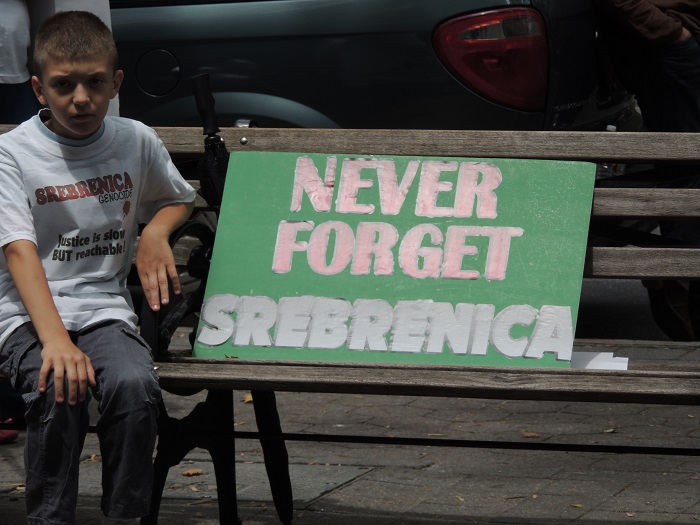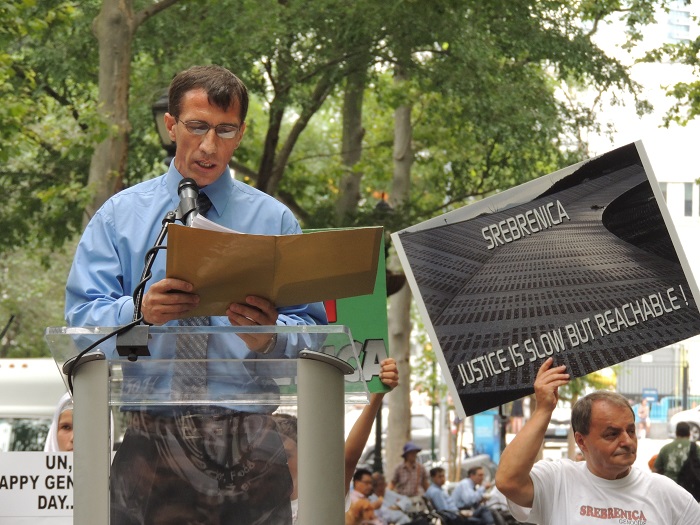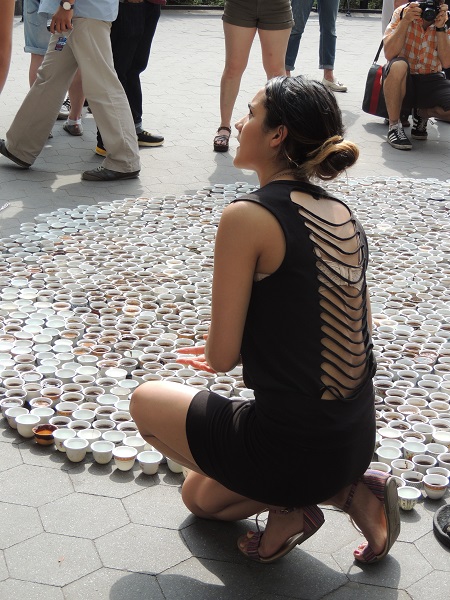 Photo by Flossie Baker
Photo by Flossie Baker
In July 1995, at least 8,372 Bosnian Muslim men and boys were systematically killed as part of a genocidal campaign during a war few understand, nor want to, largely because of the intricacies of its convoluted ethnic landscape. And yet historians know the area all too well: it is near the site where World War I began almost 100 years ago.
The Srebrenica genocide was a dark chapter in an already nasty Balkan conflict. One group committed ethnic cleansing against another, as a largely passive international community helplessly, and needlessly, watched it from the sidelines.
"People know who the perpetrators are (of the massacre). We all know who the chief perpetrators were; Radovan Karadzic, and Ratko Mladic," CNN's Christiane Amanpour recalled in a 2008 interview in Sarajevo. Amanpour, along with other intrepid reporters, including Roy Gutman, Chuck Sudetic, John Burns, Kurt Schork and David Rohde had tried, largely in vain, to warn, and admonish international leaders for their inaction.
It has been reported that most of the Bosnian victims were unarmed and ill-equipped to fight Ratko Mladic's forces. Mladic, who had been a strong-arm for Serbian president Slobodan Milosevic orchestrated the separation of men and boys from women, a strategy that may be compared to Nazi tactics in the death camps. Bosnian males were killed in ambushes and by mass executions.
As chief diplomat Richard Holbrooke wrote in "To End a War," his account of the Balkan wars and its aftermath where he helped to facilitate the Dayton Accords in 1995, "the name [Srebrenica]would become part of the language of the horrors of modern war, alongside Lidice, Oradour, Babi Yar and the Katyn Forest."
This grim backdrop set the scene on a balmy afternoon at the Dag Hammarskjold Plaza near the United Nations on July 11 to commemorate 18 years since the Srebrenica genocide. The somber day featured survivors and delegates speaking painfully and eloquently about the losses they experienced, and much like the lessons needed to be learned from the Holocaust: the world must never forget. The mantra of the day was to stop genocide wherever and whenever it happens, whether it is in Bosnia, Rwanda, Sudan or some argued, Syria.
"I wish to express to you my gratitude to all of you commemorating this day," H.E. Ms. Mirsada Čolaković, Ambassador of Bosnia and Herzegovina said. "It is fulfilling a civilization-duty never to forget the crime of genocide, but also that the perpetrators be prosecuted in court and punished for the crimes. As politicians, the least thing we can do is increase the pain of the families of the victims, but what we must do is create opportunity for our children to live in the country in which the crime of genocide will never happen."
By July 1995, General Mladic focused his attention on three isolated Muslim enclaves in eastern Bosnia; the towns of Srebrenica, Zepa and Gorazde. These places were surrounded by Serb forces since early on in the war, and a small number of U.N. peacekeepers were sent to each enclave. They soon were bottled up and were unable to break the siege conditions. By the summer in 1995, all three towns had been filled up by Muslim refugees from the surrounding areas. Mladic decided to eliminate the enclaves entirely in order to secure the entire eastern portion of Bosnia for the Serbs.
By July 6, 1995, Mladic's forces began shelling Srebrenica, allegedly in retaliation for forays into Serb territory by Bosnian Muslim forces. Three days later, the Serbs took 30 Dutch peacekeepers hostage and on July 10 his forces took over the town. 370 Dutch U.N. peacekeepers were held hostage.
When Mladic entered Srebrenica, he announced that he was 'presenting this city to the Serbian people as a gift. "Finally after the rebellion of the Dahijas, the time has come to take revenge on the Turks in this region'- a reference to a Serb rebellion against the Ottomans that was brutally crushed in 1804," Holbrooke wrote in his memoirs. "Mladic's identification of modern-day Bosnian Muslims with the Turks of 191 years earlier was revealing of his dangerously warped mind-set.' 8,372 Bosnians were then systematically killed.
"We have 8,372 reasons to be sad today; we have 8,372 reasons to seek justice; we have 8,372 reasons to tell the truth; 8,372 is the number of human beings who disappeared in one day," a defiant but war-scarred Senahid Halilovic said to the gatherers in New York paying their respects. Halilovic, now 41, had his father and three brothers killed in Srebrenica.
 Photo by Flossie Baker
Photo by Flossie Baker
"The number may be more than just 8,372," he said. "Human standards are often misleading. The exact number only God knows but we do know is that the number is definitely greater than 8,372. Genocide occurred in other places in Bosnia Herzegovina, too."
Halilovic offered 18 reasons -- marking the year of commemoration -- to underscore to the international community to never allow such a genocide to occur again. "18 years later: we have 18 messages that there are still people alive," Halilovic said. "[Ban Ki Moon] must think that genocide can happen anywhere in the world. We are here to seek justice. The UN (and the international community as a whole) did not do their job. We will not stop seeking from justice as long as there is one person still alive, we will seek justice."
Holbrooke wrote in his book that his attempts to stop Serb aggression were ignored. "My recommendation -- to use air-power against the Bosnian Serbs in other parts of the country, as well as Srebrenica -- had been rejected by the Western European nations that had troops at risk in Bosnia, and by the Pentagon."
The International Court Tribunal of Yugoslavia, which began in 1993, has stated that it has found evidence that atrocities were committed in 20 municipalities in Bosnia.
"Srebrenica was a crime of our time," U.N. Secretary General Ban Ki Moon said when he visited the town in July, 2012. "The international community failed in preventing the genocide that unfolded. But we have learned from the horror, and we are learning still... But Srebrenica also gave birth to a new international resolve for justice, accountability, for a responsibility to protect civilians."
As Serbia was seeking its membership into the European Union in recent years, their authorities had arrested Mladic for his role in the Srebrenica genocide. It took many years. Some may argue it may have been a cynical ploy by the Serbian government to play nice with the international community in order to achieve EU membership.
Mladic has since been extradited and has been brought to the International Criminal Court in the Hague for war crimes. The verdicts in his trial and in the 24 other ongoing trials are expected by 2016, according to Balkan expert Elizabeth Pond.
Milorad Trbic, the former chief of security of the Zvornik Brigade of the Army of Republika Srpska, was sentenced to 30 years in prison in 2011; he has been the first person convicted of genocide. Thus far, eight people have admitted guilt for crimes committed in Srebrenica, according to Pond. 38 Bosnian Serb military or police officials were convicted, including some for genocide, for their roles in Srebrenica.
Serbia has slowly accepted accountability for its actions in the the Bosnian War. "The [Serbian] national assembly also extends its sympathy and condolences to the families of the innocent civilian victims of Serbian nationality in the conflicts in Bosnia and Herzegovina," the government wrote in a recent statement to victims.
However, as was the case with the aftermath of the Holocaust, "denial is still there. Denial does not lead to reconciliation and justice" Halilovic said.
All this underscores how learning about what happened in Srebrenica remains paramount for future generations. As the prevailing motif of the day expressed eloquently, 'justice is slow but reachable.'
 Photo by Flossie Baker
Photo by Flossie Baker
Gatherer at Washington Square Park paying her respects to the victims killed in Srebrenica. The public art project entitled "Što Te Nema?" involved placing small, porcelain coffee cups on the ground and filling them with Bosnian coffee prepared throughout the day.
